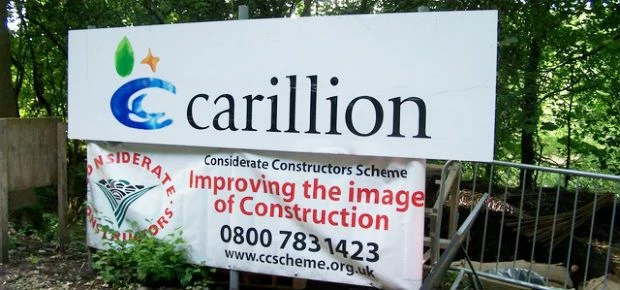
How the Carillion collapse could cost UK taxpayers £148m
According to the National Audit Office (NAO), the collapse of Carillion is set to cost UK taxpayers an estimated £148m.
There will also be wider costs to the economy, as well as Carillion’s customers, staff, the supply chain and creditors, the NAO continued.
When it was liquidated with debts of £1.5m in January 2018, the firm had around 420 UK public sector contracts. Since then, almost two-thirds of its UK workforce have found new jobs.
The NAO has said that 11,638 Carillion workers in the UK, about 64 per cent of the total, were now employed elsewhere. Of the rest, 2,332 - 13 per cent of the total - had been made redundant and the remaining 3,000 were still employed by Carillion.
The NAO said the £148m estimated loss was subject to a range of uncertainties, such as the timing and extent of asset sales.
However, it would be covered by money already provided by the Cabinet Office to help finance the costs of liquidation.
Almost all services provided by Carillion continued uninterrupted after the firm’s collapse, although work on some construction projects stopped, including building work on two hospitals funded by Private Finance Initiatives, the NAO said.
Apparently, Carillion’s non-government creditors were unlikely to recover much of their investments. In addition, the firm’s extensive pension liabilities, which amounted to £2.6bn at the end of June 2017, would have to be compensated through the Pension Protection Fund.
Speaking to the BBC, Amyas Morse, head of the NAO, said: “[The] government needs to understand the financial health and sustainability of its major suppliers and avoid creating relationships with those which are already weakened.”
A spokesman for the Cabinet Office said the government’s priority was to ensure public services provided by Carillion continued to run smoothly and safely.
Labour’s shadow Cabinet Office minister, Jon Trickett, added: “The government’s dogmatic commitment to the failed outsourcing ideology blinded it to the large risks.
“The Tories were more concerned about the commercial interests of big business than protecting taxpayers’ money or public services.
“Carillion held £1.7bn of public contracts, but this report suggests that ministers were working for the company, not the other way around. The same corporate bosses who are responsible for Carillion’s failure pocketed millions while going to the taxpayer…”
Looking to promote your product/service to SME businesses in your region? Find out how Bdaily can help →
Enjoy the read? Get Bdaily delivered.
Sign up to receive our popular morning National email for free.








 Raising the bar to boost North East growth
Raising the bar to boost North East growth
 Navigating the messy middle of business growth
Navigating the messy middle of business growth
 We must make it easier to hire young people
We must make it easier to hire young people
 Why community-based care is key to NHS' future
Why community-based care is key to NHS' future
 Culture, confidence and creativity in the North East
Culture, confidence and creativity in the North East
 Putting in the groundwork to boost skills
Putting in the groundwork to boost skills
 £100,000 milestone drives forward STEM work
£100,000 milestone drives forward STEM work
 Restoring confidence for the economic road ahead
Restoring confidence for the economic road ahead
 Ready to scale? Buy-and-build offers opportunity
Ready to scale? Buy-and-build offers opportunity
 When will our regional economy grow?
When will our regional economy grow?
 Creating a thriving North East construction sector
Creating a thriving North East construction sector
 Why investors are still backing the North East
Why investors are still backing the North East